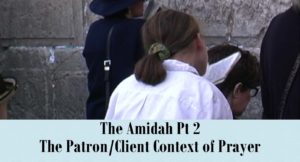The Amidah: Approaching God as King and Provider
 For the next few months, we will be exploring all the places where the Amidah, also known as The Eighteen, or standing prayers, show up in the New Testament, but first I want to give the context of what these prayers meant in the ancient world. To begin, I happened upon a realization last week that has changed everything for me even though I have been praying them for some time now.
For the next few months, we will be exploring all the places where the Amidah, also known as The Eighteen, or standing prayers, show up in the New Testament, but first I want to give the context of what these prayers meant in the ancient world. To begin, I happened upon a realization last week that has changed everything for me even though I have been praying them for some time now.
It started with a strange dream about my going back to school – I had a class schedule and from 6:30 to 7:30 three nights a week I saw that I had “music lessons.” That was it, with no accompanying description. So, I went to my bookshelf that first night and grabbed Mowinckel’s Psalms in Israel’s Worship. Decided to read it from the beginning this time and not just pick and choose chapters. The first chapter had a special note that about knocked me over:
In Hebrew, the Psalms are called Tehillim – and Tehillim is derived from the word hillel, meaning:
“the utterance of shouts of joy and exultation arising from an overwhelming feeling of exaltation and strength and pride….implies shouting in honor of somebody.” pg 219 Note:1 (emphasis mine)
The Psalms were an integral part of Israel’s prayer book, incorporated into the Temple service and quoted prolifically in both the liturgical prayers and rituals during the first and second Temple times. The Septuagint and Dead Sea Scrolls bear witness to the usage of these Psalms in the Temple on specific days and at specific festivals, as do other contemporary writings. It is only in relatively modern times that both Jewish and Christian scholars removed the Psalms from this context with subtitles such as, “Composed by David after his adultery with Bathsheba” when we find no such ancient associations. Indeed, it became a popular pastime to try and guess which Psalms were written by who and what life event to match them up with, as opposed to viewing them with regards to the Temple and its services. But these associations are not in the original text; they are really just legends created by scholars.
That being said, I looked once again at the Amidah prayers with new eyes based on Mowinckel’s note.
Psalms – uttered as shouts of joy, exultation combined with feelings of strength and pride – in honor of God. This clearly fits in with the ancient honor/shame culture of Scriptural times – when honoring a God or a King meant to lavish them with praise for their excellence; laud their achievements; proclaim the height and breadth and depth of their authority. It also meant to present all one’s petitions at their feet as though they and they alone had the ability to open their hand and supply every need.
This is the essence of the patron/client context of the ancient world – where money meant nothing compared to prestige, and money would be freely spent to purchase greater levels of renown. Let me explain:
In the first century (probably back to the dawn of time, really), those who were in need – be they artisans or farmers, people seeking appointment to office or alms – would gather in the courtyard of a great house and petition the lord or lady of that house to supply their need. The great lord or lady was called a patron, or a benefactor, and they graciously extended their hand to meet the need of the petitioner, called a client. Although this was a gift given freely (no I am not making this language up), it was universally understood that the person who received that gift was expected to give back to their benefactor. The artist would dedicate their works; the farmer would return the blessing with food for their sponsor’s table; the man who received a good word and who was placed into a position of authority used it for the benefit of the patron; the beggar did what all of them were expected to do – proclaim the glory and increase the good reputation of the great man or woman who had met their need. In return, the patron, seeing that his gift had not been met with ingratitude, would be very pleased to meet another need in the future and the cycle would continue. This relationship had a name – charis – and in the Epistles of Paul, that is the word translated as grace.
Paul used this specific cultural relationship to explain our mutual relationship with the God of Abraham, Isaac, Jacob and Messiah Yeshua (Jesus). In it, he described what Jews already knew- God, and God alone is our great patron and Yeshua the Divine Mediator between God and man. The prayers of the Temple and synagogue are spoken in the language and tone of grateful petitioners before their Patron King, Creator of Heaven and Earth and all that is in them, Author of Life, Salvation, Redemption, Forgiveness and All That Is Good. Like the Herald in a royal court, the prayers first address the Patron Sovereign in adoration, and then the audience shifts and the worshipper starts addressing all of Creation, and then turns attention back again to address the Master. I am going to borrow some text from chabad.org to show you what happens in the prayers and how it reflects the honor and royalty of our Great God and King:
As in a true royal court, the petitioner steps forward into the presence of the King and then bends the knee and bows as he proclaims:
Blessed are You, L-rd our G‑d and G‑d of our fathers, G‑d of Abraham, G‑d of Isaac and G‑d of Jacob, the great, mighty and awesome G‑d, exalted G‑d, who bestows bountiful kindness, who creates all things, who remembers the piety of the Patriarchs, and who, in love, brings a redeemer to their children’s children, for the sake of His Name.
He bends the knee and bows again as he says:
O King, (You are) a helper, a savior, and a shield. Blessed are You L-rd, Shield of Abraham.
You are mighty forever, my L-rd; You resurrect the dead; You are powerful to save.
This would happen in courtyards all over the world in ancient times as people drew near to pay tribute to their patrons in praise, for the sake of their honor. Now watch the intended audience change to humanity and all of Creation:
He sustains the living with loving kindness, resurrects the dead with great mercy, supports the falling, heals the sick, releases the bound, and fulfills His trust to those who sleep in the dust.
This would also happen in the ancient world – those who received patronage wouldn’t just thank and praise their patron, they would tell everyone about the patron’s greatness and generosity. Again, the audience shifts back to God in adoration:
Who is like You, mighty One! And who can be compared to You, King, who brings death and restores life, and causes deliverance to spring forth!
The prayers, all eighteen sections, go back and forth like this during the Feast liturgies as the Nation gathers to pay tribute to our God and King with one voice, in one accord – speaking to Him and to all Creation. Proclaiming the adoration of the one who has given us so much, speaking with absolute respect, and speaking those praises to the world as well. But there’s more:
After proclaiming faith in God’s abilities, generosity, and promises, we come before Him with every conceivable need that we, as an entire nation, have. We pray for all of us as one people – these are not selfish prayers, but selfless prayers for the common good. These petitions, far from being “gimme gimme” prayers, are proclamations straight out of Scripture of God’s promises and our request that He act on our collective behalf. The Amidah, far from being a series of vain repetitions, acknowledges God as the One who controls absolutely everything – by coming to Him with all of our needs, we are saying that He is all we need. We have no need of other gods before Him, or beside Him. He is our all in all.
This was how one showed respect in the ancient world, and it was a good system – much superior to the one we have today where we so easily forget and walk away from those who been generous to us as soon as they annoy us, or because we can’t be bothered to thank them. The patron/client system was one of absolute loyalty – people in the ancient world would be ashamed not to give back to their benefactor. Not so with us, we feel entitled to take and take and take and so the Amidah seems foreign to us. We don’t know how to properly thank and treat even the mere men and women who have given much to us, and so we look at such prayers to God as excessive.
They aren’t excessive; we are simply stingy with our gratitude. I want you to think about that – because we are not stingy with our requests, just with our thankfulness. Is God our King? Do we treat Him with less attention than we would lavish on a celebrity or traveling dignitary? Can we praise Him too much? Can it be excessive to proclaim the truth about His attributes daily?
Tell me, would a King who hates “excessive” praise be surrounded with angels who cry out “Holy, holy, holy,” 24/7/365 forever? I am thinking the answer to that would be no – although really, how can one excessively praise God in the first place? Such a thing is impossible.


